Meeting with EU foreign policy chief and its 28 foreign ministers Monday, aging leader looks to bloc as replacement for US mediator, top PA minister says
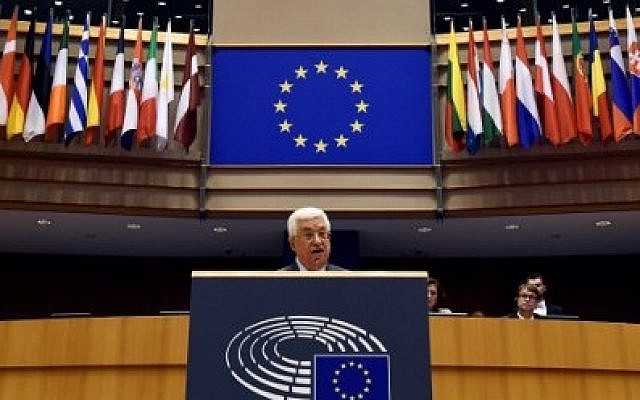
Palestinian Authority President Mahmoud Abbas will ask the European Union to officially recognize the state of Palestine when he meets foreign ministers from the bloc on Monday, a senior official said Sunday.
Abbas is scheduled to meet with EU diplomatic chief Federica Mogherini and the foreign ministers of the Union’s 28 countries on the sidelines of their monthly meeting. Israeli Prime Minister Benjamin Netanyahu held a similar meeting last month.
The issue of recognition of a Palestinian state is expected to be at the top of the agenda for Monday’s talks.
Palestinian foreign minister Riad al-Malki said Sunday that Abbas will tell the EU it should take the step of recognizing Palestine “as a way to respond” to US President Donald Trump’s decision to recognize Jerusalem as the Israeli capital.
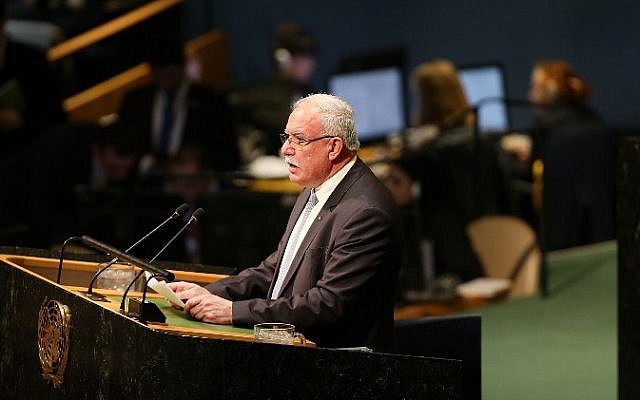
Abbas will also “reiterate his commitment to the peace process” in the Middle East, Malki said in an interview with AFP in Brussels. “He’s going to say I’m not going to withdraw from the peace process, I will stay committed.”
A week ago Abbas denounced Trump’s efforts to resolve the long-running conflict as the “slap of the century” and caused alarm by saying Israel had sunk the so-called Oslo accords that underpin the stalled peace process.
Changing roles
After Trump recognized Jerusalem as the capital of Israel in December, and said that he plans to move the US Embassy to the city from Tel Aviv, the Palestinian leadership declared Washington could no longer fulfill the historic and central role in the peace process it has held for over two decades.
Trump said his declaration reflected reality on the ground, and was not intended to prejudge any future arrangement between Israel and the Palestinians regarding the disputed city, though he later said it had taken Jerusalem off the table. Welcomed by Prime Minister Benjamin Netanyahu and leaders across most of the Israeli political spectrum, the move caused an uproar throughout the Muslim world and was panned by the United Nations, the European Union, and many European countries.
Last week, the Central Committee of the Palestine Liberation Organization’s (PCC) — the second-highest decision-making body for Palestinians — ratified that the US had “lost its eligibility to function as a mediator and sponsor of the peace process” until it reverses the Jerusalem decision. This week, Abbas and the Palestinian leadership are refusing to meet US Vice President Pence, who landed in Israel Sunday evening, making his visit a rare one by a high-ranking US official not to include talks with the Palestinians.
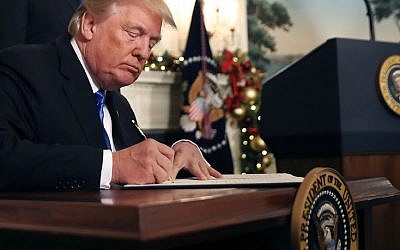
Abbas will now urge the EU to take on a bigger role in trying to move peace efforts forward, declaring American “exclusivity and monopoly” in the process is over, Malki said.
“Since Trump’s decision has altered the rules of the game, he [Abbas] expects the European foreign ministers to come forward and collectively recognize the state of Palestine as a way to respond back to Trump’s decision,” Malki said. “If the Europeans want to be a player then they have to be fair in their treatment of both parties and this should start with the recognition of the state of Palestine.”
Diplomats and officials in Brussels say recognition for Palestine is not on the cards on Monday — the EU leaves recognition in the hands of individual members — and the best Abbas can hope for is progress towards an “association agreement” with the bloc.
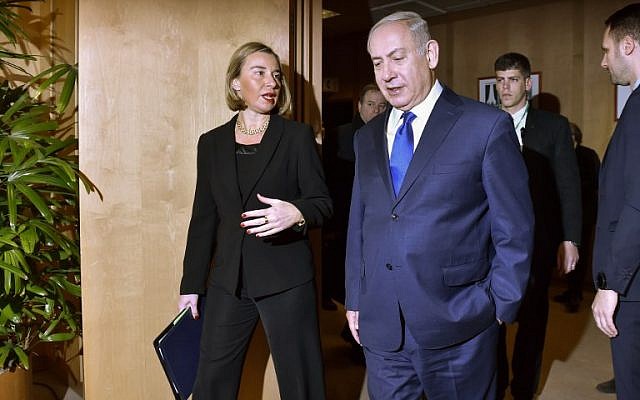
Malki said that while the Palestinian Authority was “very serious” about such an agreement, they also expected to be formally recognized as a state.
“One does not replace the other. Absolutely not,” he said.
The French newspaper Le Monde reported on Sunday that France is trying to upgrade the Palestinian Authority’s status at the EU, but will stop short of recommending full recognition of a Palestinian state.
The French are reportedly pushing for an EU free trade agreement with the Palestinians, similar to the one signed with Israel.
Individual recognition
Regardless of an EU agreement, several European countries appear to be closer than ever to individual recognition of a Palestinian state.
Slovenia is planning to recognize Palestine as an independent state next month, and three other European countries — Luxembourg, Ireland and Belgium — are thinking of following suit, Channel 10 news reported Sunday.
Last month, Slovenian Parliament Speaker Milan Brglez told Palestinian Ambassador Salah Abdel-Shafi that Slovenia’s recognition of a Palestinian state was “not in doubt,” but just a question of timing.
The Slovenian ambassador in Tel Aviv, Barbara Sušnik, told The Times of Israel Sunday that the issue of recognizing Palestinian statehood has been pending in the country’s parliament since 2014, and is only now coming to a vote.
She confirmed that the foreign affairs committee will vote on the matter on January 31. If the committee votes in favor of recognizing Palestine, the issue will be brought to a vote in the full plenary of the Parliament.
The Channel 10 report said that Israel’s Foreign Ministry has been trying to recruit Slovenian lawmakers to oppose the move, although expectations are low that the process can be stopped.
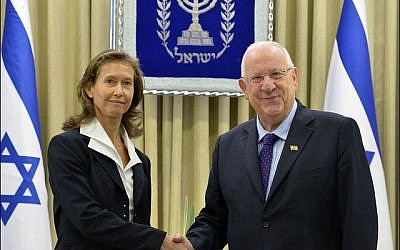
Additionally, according to Channel 10, Luxembourg’s foreign minister called several days ago for a group of European countries to come together and recognize a Palestinian state, and is reportedly trying to convince France to lead the initiative. Ireland’s foreign minister, who recently visited Israel, conveyed at the time that his country was seriously considering recognizing a state of Palestine, the report said. It also named Ireland and Belgium as countries that could soon recognize Palestinian statehood.
Sweden was the first western European country to recognize Palestine, in October 2014.
In December 2014, in a symbolic move not binding on government policy, French lawmakers voted in favor of recognizing Palestine as a state, following similar moves in Britain and Spain, as European countries tried to restart the stalled Middle East peace process. Italy also followed suit in 2015.
As reported by The Times of Israel
